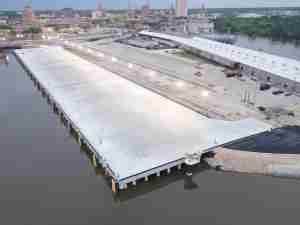For over 60 years, the Who’s Who of the coffee industry has met once a year in London at the British Coffee Association Dinner-Dance for an average of 500 guests, who include Hamburg coffee experts. Port of Hamburg Marketing together with a few Hamburg warehousekeepers took this annual international coffee industry event as the occasion to host a port reception at the Little Ship Club in London to present the strength and great variety of the services that the Port of Hamburg offers.
66 participants from both Hamburg and the UK, from the seaport business, shipping, logistics, the food and spice trades, as well as regional media representatives, briefed themselves at the port reception on handling trends as well as important infrastructure projects of the Port of Hamburg, the great service provided by warehousekeepers in Hamburg, and the range of feeder connections between Hamburg and the United Kingdom. Michael Bruhns of Werner Bruhns Lagereigesellschaft mbH, Finn Börnsen of Vollers Hamburg GmbH, Sören Heedgard of Unifeeder UK, Wolfgang Hurtienne of Hamburg Port Authority and Axel Mattern of Port of Hamburg Marketing were the expert speakers.
Unifeeder connects British ports with Hamburg three times a week. Along with feeder services by “K” Line and ACL, altogether five weekly sailings link Germany’s largest seaport and the UK.
As an overseas port, Hamburg acts as an important hub for the UK for the distribution of feeder cargo, especially in the Baltic area. Smooth outward and inbound flow of goods between shippers and ports represent a crucial competitive factor here. Thanks to its central location in Europe and its superbly developed infrastructural connections with its European hinterland by rail, inland waterway craft and truck, the Port of Hamburg provides direct access to a market of more than 500 million consumers.
In 2010 throughput of seaborne cargoes handled between Hamburg and the United Kingdom totalled around 5.8 million tons. Apart from containerized general cargo, it was above all imports of crude oil, oil products, building materials and stone products from the United Kingdom, along with exports of oil products, fertilizers, chemical substances and animal feedstuffs from Hamburg that underpinned the upward trend in throughput.










